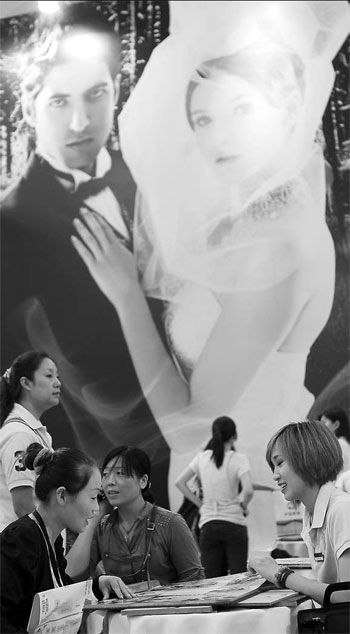Investment
Investors eager for slice of country's wedding cake
By Wang Zhuoqiong (China Daily)
Updated: 2010-09-04 07:35
 |
Large Medium Small |
|
People consult prices at the Beijing Wedding Expo on Friday. Wang Jing / China Daily |
BEIJING - Having dated for three years, Wang Zhijun and his girlfriend decided to tie the knot.
Buried in piles of work, the couple, both marketing managers at media companies in Shanghai, found it impossible to run through all the preparations for their wedding.
A one-stop wedding venue that provides wedding photography, the ceremony, dresses and food came to the rescue.
"The company saved us from all the trips and work needed for the wedding from the very beginning," said Wang, 30, who married his love last month at the Villa Grandis near the Huangpu River.
"They delivered a tastefully themed wedding without dragging us from one place to another. All we needed to do was speak of our expectations and wishes for the big day."
A wedding ceremony that mixes Western style and Chinese tradition followed by a banquet is favored by most couples getting married these days.
One-stop wedding venues, a trend picked up from Japan, have now become popular in Shanghai, where six venues are operating. They are also becoming more fashionable in other cities, including Beijing and Suzhou.
"People in Shanghai like fresh ideas," said Hu Guoping, a marketing manager at Villa Grandis, a wedding service provider launched in 2008 with investment from Japan.
The store opened its second branch in Shanghai last year, after its first outlet, in Nanpu district, was a great success.
The average couple using the Villa Grandis service spends 130,000 yuan ($19,000) to 150,000 yuan, a figure that is much higher than the national level of 60,000 yuan, according to Shi Yu, vice-director of the Committee of Wedding Service Industries of the China Association of Social Workers, who spoke to China Daily during the Beijing Wedding Expo on Friday.
The wedding house service is a natural development in China's wedding market to better integrate various wedding services, a result of heated market competition, Shi said.
"Such a one-stop wedding provider is booming in many cities," he said. "Investors are eager to get a share of the big cake."
In Beijing, there are 1,168 registered wedding planning companies and 4,650 registered wedding venues and service providers, Shi said. In the past decade, about 9.12 million couples have married each year, creating a huge market for wedding products.
In 2009, direct consumption as a result of weddings exceeded 600 billion yuan and more money is pouring into the sector, Chinese media reports said. Spending on weddings last year increased by 40 percent compared to 2006 and is growing by about 10 percent annually. Other sectors that benefit from weddings include the auto, property, decoration and tourism industries, Shi said.
China Daily
